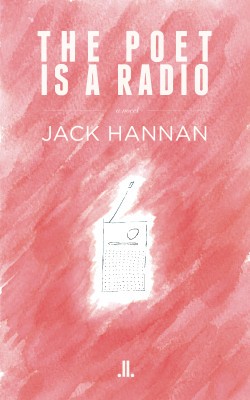Li Bai, the eighth-century Chinese poet, didn’t like to feel tied down. He spent much of his life on the road. He got married four times. Drank himself to sleep in bars. And he admired those who, as he put it, “made nothing of sea-crossing or of mountain-crossing.”
But in The Poet is a Radio, Jack Hannan’s first novel, this ancient wanderer outdoes himself. Not only has he found his way over some eleven thousand kilometres, from Sichuan to Montreal. He has also managed to make a jump more dramatic than any continent-crossing: he has safely travelled across twelve centuries, into the present.
Hannan offers no explanation as to how Li Bai came to be in twenty-first- century Montreal. All we know is that he has borrowed some details from Li Bai’s real life in China as a backstory, and that, in more recent years, the poet has been city-hopping across Europe and North America. What happened between his historical death in 762 and the present is anybody’s guess.

The Poet Is a Radio
Jack Hannan
Linda Leith Publishing
$14.95
paper
162pp
9781927535981
The novel is a snapshot of one of those pockets of vitality: the staff members and customers of a bookstore on the brink of bankruptcy, who are all trying to wake Montrealers up out of their computer-daze. The owner, named (but not modelled) after another real-life poet, Kenneth Patchen, refuses to sell e-books and t-shirts and tote bags in the place of paper-and-ink books. His employee J.-S. spray paints poems onto the asphalt of the street, hoping to fill a whole block with beautiful words. Habana de Curra, who often comes to the bookstore to browse and chat, learns languages “the way other people put on weight.” Dwayne, the Stetson-wearing Poet of the Blue Line, drops pages of his poems into commuters’ laps, shouting “Look at yourselves, you’re dog tired, bone dry, deep in debt, and you’re all going to die.”
One might say that the book is about Li Bai becoming embroiled in someone else’s crime when he stumbles upon a duffel bag stuffed with money. Or that it’s about the unlikely romance between Habana and Dwayne. Or that it’s about a bookstore owner whose business and twelve-year relationship are falling apart at the same time.
But Hannan does not really delve into any of these stories. Rather, he flits from one to the other, giving us little more than a glimpse of each. The novel’s trajectory is as mysterious as Li Bai’s. Reading it feels as though you, too, have become a wanderer, making unexpected appearances in people’s lives, only to disappear again soon after.
We shouldn’t be surprised that Hannan’s first foray into fiction is so enigmatic. When discussing his poetry in an interview for the Montreal Gazette, he told the journalist Jeff Heinrich, “I’m not a person who has a point to make, and I very rarely write with the idea that there’s something I want to say.”
It may be hard to pinpoint exactly what The Poet is a Radio is about. But it leaves you with an image that hits home: someone passing through a foreign city, wanting both to forget and remember all of the different lives he led in what feels like some distant century, thousands of kilometres away. mRb






0 Comments